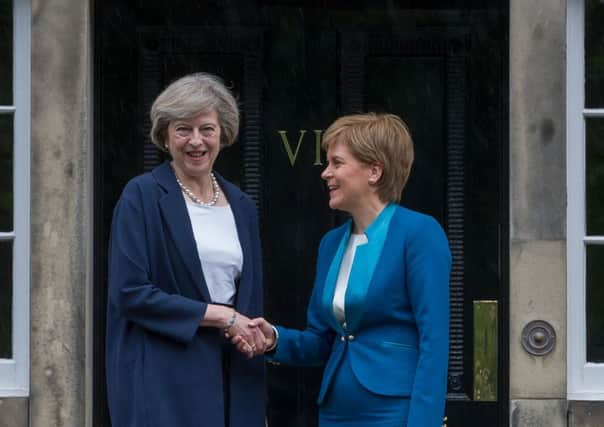Indyref2: Is it a good idea for Theresa May to '˜block' vote?


The Prime Minister Theresa May, currently dealing with other constitutional issues in Northern Ireland and the Brexit situation.
The official response from the UK Government, while not (yet) an outright no, is that the time is not right for a referendum they insist that the Scottish people don’t want.
Advertisement
Hide AdAdvertisement
Hide AdBut the Prime Minister was rattled enough that sources told journalists that she was caught completely on the hop by the announcement, and the Article 50 triggering touted for this week is now pencilled in for the end of the month.
We look at the pros and cons of Theresa May blocking a second Scottish independence referendum.
The ‘No Mandate’ Argument
As opposition politicians are keen to point out, though the argument is a little tenuous, the SNP didn’t win an overall majority at the 2016 Holyrood Election.
This is why, so goes the claim, we are in a different set of circumstances from 2011, when the SNP won a thumping majority on the proviso that they would hold a referendum on independence within that five year term.
Of course, we had that referendum in 2014, after Alex Salmond and David Cameron reached an agreement on the terms of that vote – known as the Edinburgh Agreement.
Those men have now both departed following respective referendum defeats, and it looks like a distant hope that successors Theresa May and Nicola Sturgeon can reach a similar accord.
Senior Tory MSP Adam Tomkins joined his voice to that of Lib Dem leader Willie Rennie in insisting that the SNP ‘didn’t win the election’.
That’s a handy line to have up your sleeve in situations like this, but implying that a party that received more than double the constituency votes of their nearest rival is in some way a losing one is stretching the truth to breaking point.
Advertisement
Hide AdAdvertisement
Hide AdWhile they are currently set on stopping the referendum before it happens, it’s possible that the position of the Tories could change once the SNP and Greens vote to ensure that the Section 30 request is given majority backing in Holyrood.
Economic Uncertainty
The key argument against independence, and a new independence referendum, is primarily an economic one.
Theresa May will argue that it is better for Scotland to try and make a success of Brexit along with the other constituent parts of the United Kingdom.
The Prime Minister can also point to interventions from bodies such as the Scottish Chambers of Commerce advising against another vote.
That could be exacerbated by the refusal of Nicola Sturgeon to name a specific date for her planned plebiscite, with only the timeframe of between Autumn 2018 and Spring 2019 offered.
However, that could be undermined slightly by the argument that we are already in a period of uncertainty due to the two year period following the triggering of Article 50.
This lack of clarity was also apparent before the Brexit vote in 2016, with a referendum promised in 2013, but the final date for the poll not announced until February of 2016, just four months before the landmark decision was taken.
As Sturgeon noted in her speech, as the First Minister of Scotland she still has no idea when that Brexit process will officially get underway.
Once in a Generation
Advertisement
Hide AdAdvertisement
Hide AdProbably the most powerful argument that Theresa May can deploy if she decides to go all out and block the transferring of Section 30 to allow the SNP to hold another referendum.
Nothing is more powerful to highlight hypocrisy than using someone’s own words against them to show how they’ve contradicted themselves.
Nicola Sturgeon is on record as saying that she believed that the 2014 vote on Scotland breaking away from the rest of the UK was a once-in-a-lifetime opportunity.
That went even further than the words of her then boss Alex Salmond, who said that the first indyref was a ‘once-in-a-generation’ chance.
While it could, at a push, be argued that in political terms the time that’s passed counts as a generation, it’s hard to claim with a straight face that a lifetime lasts four years.
The SNP can hit back that what they said was a warning, not a promise, that the 2014 decision could be the last one Scots got to make, and that they didn’t perceive a situation where Scotland was ‘dragged out of the EU against our will’.
Settled Will
Tied intrinsically into that argument is the valid point that given it was such a short time ago, it is a stretch to assume that Scots will have changed their mind on such a huge, country-defining issue.
While some Unionist politicians are guilty of slightly overstating their referendum win, which was hardly a landslide, a 10% victory is by no means a result which implies Better Together barely won.
Advertisement
Hide AdAdvertisement
Hide AdThe 55-45 margin hasn’t been overturned by a consistent run of polls, with public opinion wildly different from poll to poll.
Apart from the Lib Dems pushing for a final say on the terms of our exit deal, there is little appetite, even among remain politicians, for a rerun of the Brexit referendum in 2016.
Theresa May could easily deny the SNP the right to hold the referendum on the grounds that the issue is settled, just like devolution was deemed the settled will of the people in 1999.
With that, Theresa May could give a powerful voice to unionists in the Scottish parliament to vote against Nicola Sturgeon’s proposals.
As always, for the Prime Minister, there is no obvious right answer, and whichever route Theresa May pursues will have a huge impact on Scotland’s future.